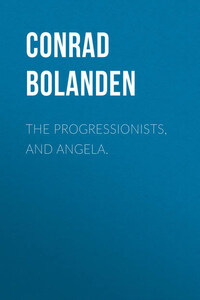The balcony of the palais Greifmann contains three persons who together represent four million florins. It is not often that one sees a group of this kind. The youthful landholder, Seraphin Gerlach, is possessor of two millions. His is a quiet disposition; very calm, and habitually thoughtful; innocence looks from his clear eye upon the world; physically, he is a man of twenty-three; morally, he is a child in purity; a profusion of rich brown hair clusters about his head; his cheeks are ruddy, and an attractive sweetness plays round his mouth.
The third million belongs to Carl Greifmann, the oldest member of the group, head pro tem. of the banking-house of the same name. This gentlemen is tall, slender, animated; his cheeks wear no bloom; they are pale. His carriage is easy and smooth. Some levity is visible in his features, which are delicate, but his keen, glancing eye is disagreeable beside Seraphin's pure soul-mirror. Greifmann's sister Louise, not an ordinary beauty, owns the fourth million. She is seated between the young gentlemen; the folds of her costly dress lie heaped around her; her hands are engaged with a fan, and her eyes are sending electric glances into Gerlach's quick depths. But these flashing beams fail to kindle; they expire before they penetrate far into those depths. His eyes are bright, but they refuse to gleam with intenser fire. Strange, too, for a twofold reason; first, because glances from the eyes of beautiful women seldom suffer young men to remain cool; secondly, because a paternal scheme designs that Louise shall be engaged and married to the fire-proof hero.
Millions of money are rare; and should millions strive to form an alliance, it is in conformity with the genius of every solid banking establishment to view this as quite a natural tendency.
For eight days Mr. Seraphin has been on a visit at the palais Greifmann, but as yet he has yielded no positive evidence of intending to join his own couple of millions with the million of Miss Louise.
Whilst Seraphin converses with the beautiful young lady, Carl Greifmann cursorily examines a newspaper which a servant has just brought him on a silver salver.
"Every age has its folly," suddenly exclaims the banker. "In the seventeenth century people were busy during thirty years cutting one another's throats for religion's sake-or rather, in deference to the pious hero of the faith from Sweden and his fugleman Oxenstiern. In the eighteenth century, they decorated their heads with periwigs and pigtails, making it a matter of conjecture whether both ladies and gentlemen were not in the act of developing themselves from monkeydom into manhood.
"Elections are the folly of our century. See here, my good fellow, look what is written here: In three days the municipal elections will come off throughout the country-in eighteen days the election of delegates. For eighteen days the whole country is to labor in election throes. Every man twenty-one years of age, having a wife and a homestead, is to be employed in rooting from out the soil of party councilmen, mayors, and deputies.
"And during the period these rooters not unfrequently get at loggerheads. Some are in favor of Streichein the miller, because Streichein has lavishly greased their palms; others insist upon re-electing Leimer the manufacturer, because Leimer threatens a reduction of wages if they refuse to keep him in the honorable position. In the heat of dispute, quite a storm of oaths and ugly epithets, yes, and of blows too, rages, and many is the voter who retires from the scene of action with a bloody head. The beer-shops are the chief battle-fields for this sort of skirmishing. Here, zealous voters swill down hogsheads of beer: brewers drive a brisk trade during elections. But you must not think, Seraphin, that these absurd election scenes are confined to cities. In rural districts the game is conducted with no less interest and fury. There is a village not far away, where a corpulent ploughman set his mind on becoming mayor. What does he, to get the reins of village government into his great fat fist? Two days previous to the election he butchers three fatted hogs, has several hundred ringlets of sausage made, gets ready his pots, and pans for cooking and roasting, and then advertises: eating and drinking ad libitum and gratis for every voter willing to aid him to ascend the mayor's throne. He obtained his object.
"Now, I put the question to you, Seraphin, is not this sort of election jugglery far more ridiculous and disgusting than the most preposterous periwigs of the last century?"
"Ignorance and passion may occasion the abuse of the best institutions," answered the double millionaire. "However, if beer and pork determine the choice of councilmen and mayors, voters have no right to complain of misrule. It would be most disastrous to the state, I should think, were such corrupt means to decide also the election of the deputies of our legislative assembly."









